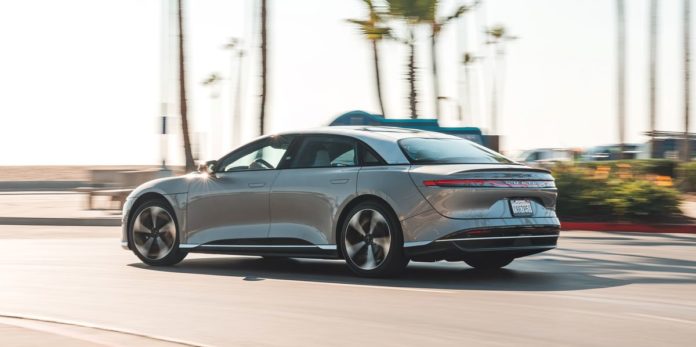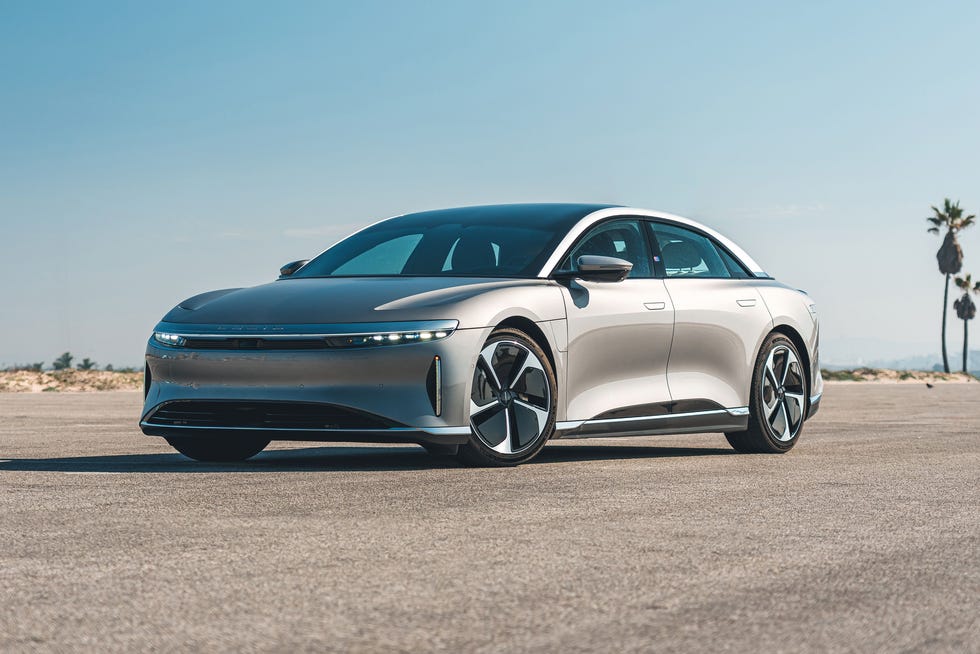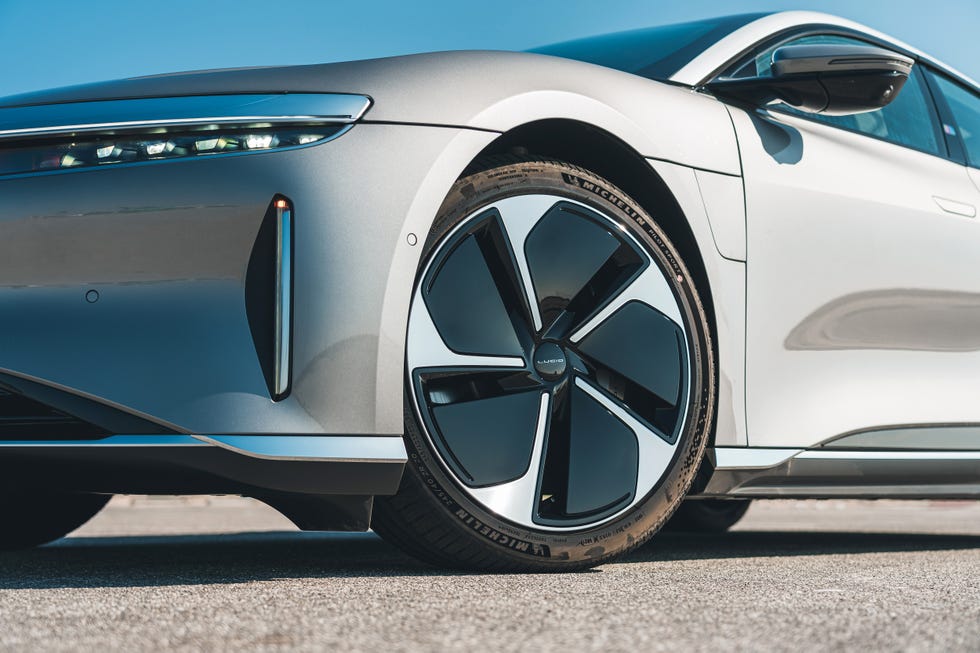Lucid’s Air Dream is no more, but our test team’s memories of its otherworldly power and range live on. Its dual-motor powertrain cranked out a reality-bending 1111 horsepower in Performance guise, while the range-oriented variant dialed that back to a mere 933 horsepower to be a certified 520-mile bladder killer.
Impressive? Absolutely. But does anyone really require that much, especially when you consider the cost? For 2023, the top-trim 1050-hp Grand Touring Performance commands over $180,000, while the 516-mile range-specialist Grand Touring hovers just south of $140K. The bigger gotcha is an unwelcome side effect of the large battery—112 kWh for the Grand Touring, 118 kWh for the Performance variant—necessary to unlock all that power and range: It occupies the rear footwells, creating a knees-up seating position that’s exacerbated by extremely little toe room under the front seats. Legroom is unquestionably abundant, so it’s still roomy back there, but the seating posture is unusual.
The Touring, which at 10 paces looks identical to the higher-trim variants, deviates in one crucial way that reverberates up and down the spec sheet: Its underfloor battery consists of 18 modules instead of 22. That drops its capacity to 92.0 kWh, but the loss of those four modules gives back rear-seat footwell room and provides a considerably more luxurious experience for passengers. In fact, Lucid was able to flatten the Touring’s bottom cushion angle slightly because the rear seat no longer needs to support legs that jut up.
Less battery capacity does reduce power and range. While the Dream and the GT have both in abundance, the Touring’s range is still a healthy EPA-rated 425 miles with 19-inch all-season tires or 384 miles with our test car’s no-cost 20-inch summer rubber. The Touring also offers 620 horsepower and 885 pound-feet of grunt. Around town, you won’t miss the absent horses, because this is still a frisky powertrain. Surging from 30 to 50 mph, for example, takes just 1.8 seconds. Even if you floor it off the line, as we do in our track tests, the difference between 1111 and 620 horsepower is a scant 0.4 second to 60 mph, with the Touring notching a still-impressive 3.0 seconds. While the Touring can’t match the Dream’s 10.1-second, 142-mph quarter-mile, buyers certainly shouldn’t feel shortchanged by 11.0 seconds at 126 mph.
The smaller battery helps shed 270 pounds, and the 5012-pound Touring indeed feels lighter on its feet in corners. Its lateral grip is a tick better at 0.93 g, while 70-mph panic stops are just four feet longer at 167 feet. Our Touring’s 20-inch Michelin Pilot Sport EV summer tires are fractionally more supple than the Dream’s 21-inch Pirellis, but otherwise the two cars’ dynamics mirror each other. On the open road, the Touring makes the miles disappear, as it is an extremely calm and capable cruiser. The ride is relaxed and smooth without a hint of float or wallow, and the taller sidewalls of its 20-inch performance rubber add an extra measure of rolling comfort.
The dead-ahead sense you get from the steering is quite pronounced, and it inspires enough confidence that we felt more comfortable using the steer-it-yourself adaptive cruise setting on the interstate instead of the Highway Assist lane-centering function that’s part of the $10,000 DreamDrive Pro option. A driver-monitoring system is present, but Lucid is not yet using it to allow Super Cruise–style hands-free driving, so you’ll still get the usual warning to keep your hands on the wheel if they’re absent for 15 seconds.
While the Touring’s rated range is quite good, we found the actual distance to be more speed dependent than we expected. Despite a stated range of 384 miles, our test car managed just 280 miles in our 75-mph highway test. Later, the car essentially matched its estimated range on a random drive that was highway-heavy but featured an average speed closer to 63 mph. All told, our Touring averaged 107 MPGe, which falls well short of its lofty 121 MPGe EPA combined rating but is still a good showing compared to other large luxury EVs.
Perhaps our Touring test car’s most noteworthy new feature was related to charging, not range. Like with a Tesla Supercharger, plug-and-charge is now fully implemented here. Nothing more than plugging in was necessary to get going at Electrify America refill stops, with charge initiation and billing happening in the background using a preconfigured account that’s set up via the Lucid ownership portal. Those of you who have futzed around getting a fast-charge going at non-Tesla sites know this is a life-changing development.
During our 75-mph range test, we had plenty of time to ponder a few quirks of the Lucid Air’s instrumentation and its control interfaces, which are quite eye-pleasing in terms of design and materials. The absence of Apple CarPlay and Android Auto reportedly will be rectified with a “coming soon” over-the-air update, but until then, your phone is suction-cupped to the windshield. The turn-signal stalk is quite short, so it’s easy to trigger the end-mounted wiper button when attempting to active the turn signals. The sweeping instrument panel and central tablet are gorgeous, but a lot of screen real estate is wasted. A large Air logo occupies a prominent spot to the right of the speedometer, with a rudimentary trip odometer on the left.
For all of that, the Air Touring carries a more palatable price of $109,050. That figure includes a conventional aluminum roof, which means buyers in the Sun Belt won’t need the $4500 glass canopy top. Our tester stickered for $127,550, which included the glass roof, a $4000 premium audio system, and that $10K DreamDrive Pro driver-assistance option we could happily do without. Of all the Air variants, the Touring strikes us as the sweet spot where price, performance, range, and passenger comfort overlap.
Specifications
Specifications
2023 Lucid Air Touring
Vehicle Type: front- and rear-motor, all-wheel-drive, 5-passenger, 4-door sedan
PRICE
Base/As Tested: $109,050/$127,550
Options: Dream Drive Pro (highway assist, surround-view monitor, hardware for future semi-autonomous driving), $10,000; glass canopy roof, $4500; Surreal Sound Pro premium audio, $4000
POWERTRAIN
Front Motor: permanent-magnet synchronous AC
Rear Motor: permanent-magnet synchronous AC
Combined Power: 620 hp
Combined Torque: 885 lb-ft
Battery Pack: liquid-cooled lithium-ion, 92.0 kWh
Onboard Charger: 19.2 kW
Peak DC Fast-Charge Rate: 250 kW
Transmissions, F/R: direct-drive
CHASSIS
Suspension, F/R: multilink/multilink
Brakes, F/R: 15.0-in vented disc/14.8-in vented disc
Tires: Michelin Pilot Sport EV
F: 245/40ZR-20 99Y LM1
R: 265/40ZR-20 104Y LM1
DIMENSIONS
Wheelbase: 116.5 in
Length: 195.9 in
Width: 76.2
Height: 55.4 in
Passenger Volume, F/R: 61/46 ft3
Trunk Volume, F/R: 10/22 ft3
Curb Weight: 5012 lb
C/D TEST RESULTS
60 mph: 3.0 sec
100 mph: 6.7 sec
1/4-Mile: 11.0 sec @ 126 mph
130 mph: 12.0 sec
Results above omit 1-ft rollout of 0.2 sec.
Rolling Start, 5–60 mph: 3.5 sec
Top Gear, 30–50 mph: 1.8 sec
Top Gear, 50–70 mph: 2.6 sec
Top Speed (gov ltd): 140 mph
Braking, 70–0 mph: 167 ft
Braking, 100–0 mph: 332 ft
Roadholding, 300-ft Skidpad: 0.93 g
C/D FUEL ECONOMY AND CHARGING
Observed: 107 MPGe
75-mph Highway Range: 280 mi
EPA FUEL ECONOMY
Combined/City/Highway: 121/121/120 MPGe
Range: 384 mi
C/D TESTING EXPLAINED




